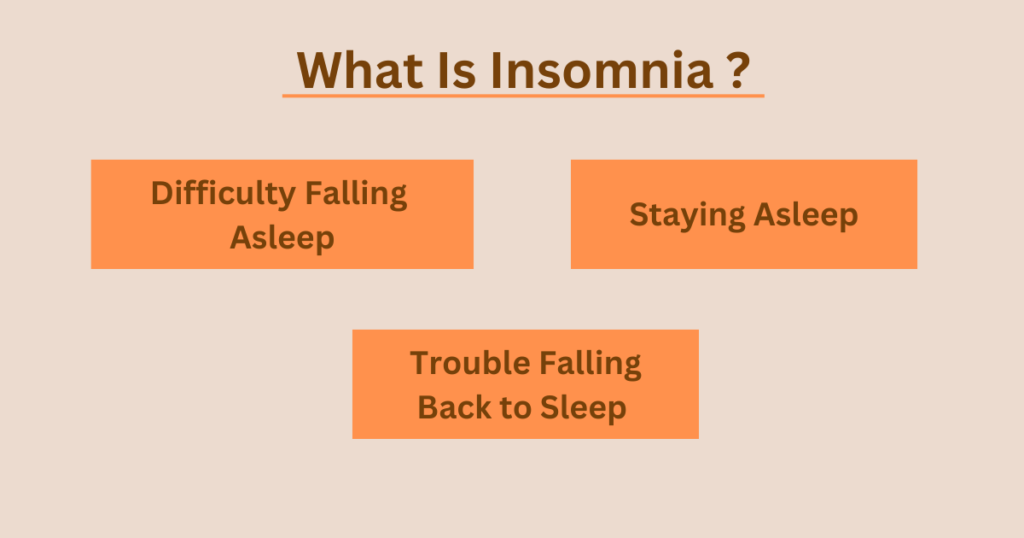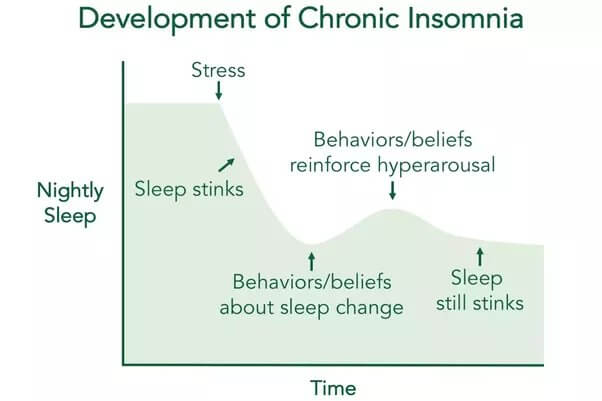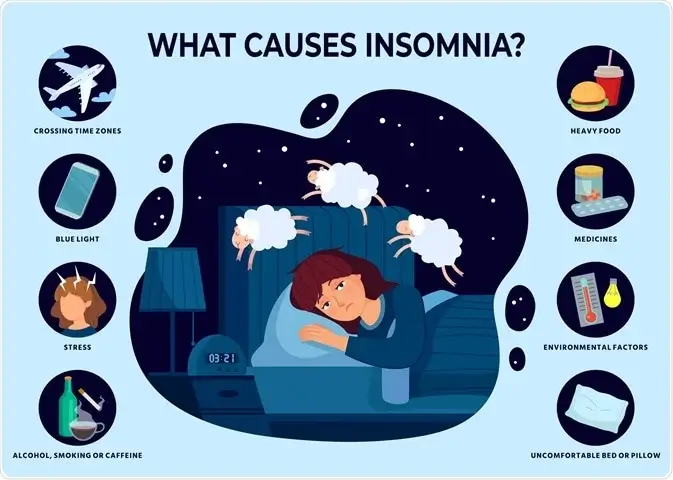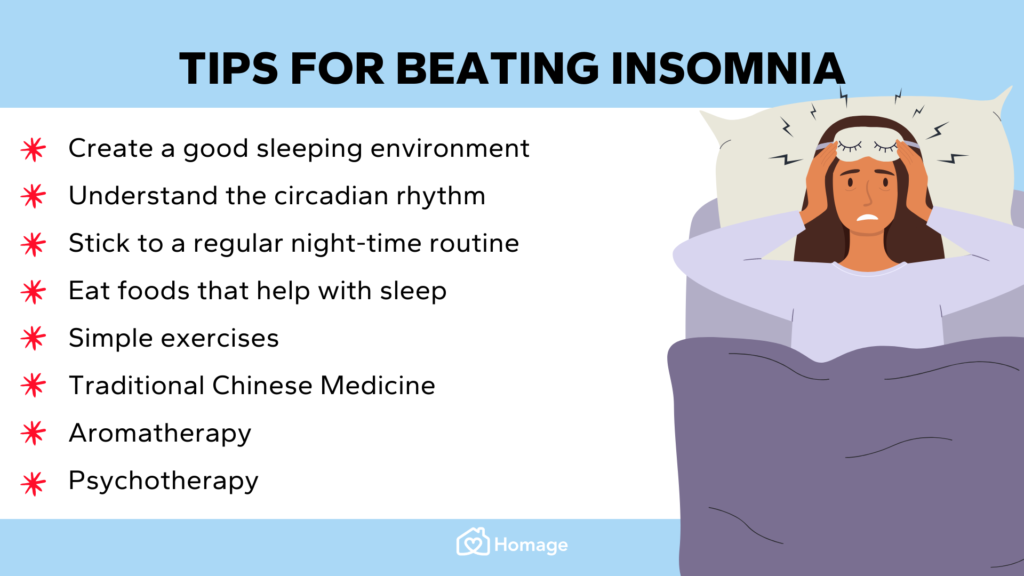Introduction

Insomnia, a sleep disorder characterized by difficulty falling asleep or staying asleep, can have a significant impact on our overall well-being. While stress and lifestyle factors can contribute to sleeplessness, it’s important to recognize that certain health conditions may also play a role. In this article, I will discuss the impact, health conditions that causes insomnia, and some tips for you to have better sleep hygiene.
Understanding Insomnia

Insomnia goes beyond a mere lack of sleep. It involves difficulty falling asleep, staying asleep, or experiencing non-restorative sleep. While occasional sleepless nights are normal, chronic insomnia persists for weeks or even months.
The Impact of Insomnia
The effects of insomnia can be far-reaching. Beyond the obvious fatigue and daytime sleepiness, it can impair cognitive function, memory, and concentration. Mood disturbances, such as irritability, anxiety, and depression, often accompany chronic insomnia. Physical health may also suffer, with increased risks of obesity, diabetes, cardiovascular disease, and weakened immune function. Recognizing the importance of quality sleep is crucial for overall well-being.
Health Conditions that Cause Insomnia
Chronic Pain and Insomnia

Chronic pain is a prevalent health condition that affects millions of people worldwide. The constant discomfort and throbbing sensations can make it incredibly challenging to fall asleep and stay asleep throughout the night.
Conditions such as arthritis, fibromyalgia, migraines, and back pain can contribute to insomnia. The cycle becomes vicious: lack of sleep can exacerbate pain, while increased pain levels make it difficult to achieve restful sleep.
Seeking appropriate pain management and exploring strategies to improve sleep hygiene are crucial steps in addressing insomnia caused by chronic pain.
Mental Health Disorders and Insomnia
The mind and body are intricately connected, and mental health disorders can significantly impact sleep patterns.
Conditions such as anxiety, depression, post-traumatic stress disorder (PTSD), and bipolar disorder often coexist with insomnia. Racing thoughts, intrusive worries, and overwhelming emotions can keep individuals awake at night, leading to a disrupted sleep schedule.
Treating the underlying mental health condition through therapy, medication, and healthy coping mechanisms can help alleviate insomnia symptoms and restore restful sleep.
Hormonal Imbalances and Insomnia
Hormonal imbalances can wreak havoc on our sleep patterns.
Conditions like menopause, polycystic ovary syndrome (PCOS), thyroid disorders, and adrenal insufficiency can contribute to insomnia. Hormonal fluctuations disrupt the delicate sleep-wake cycle, causing night sweats, hot flashes, and heightened anxiety, all of which can interfere with falling asleep and staying asleep.
Seeking medical guidance, hormonal therapy, and adopting relaxation techniques can help manage hormonal imbalances and improve sleep quality.
Respiratory Disorders and Insomnia
Respiratory disorders, particularly those that affect breathing during sleep, can be a major contributor to insomnia.
Conditions such as obstructive sleep apnea, asthma, and chronic obstructive pulmonary disease (COPD) can cause breathing difficulties, frequent awakenings, and overall poor sleep quality.
Diagnosis and treatment of respiratory disorders, including the use of continuous positive airway pressure (CPAP) machines, medications, and lifestyle modifications, are essential for managing insomnia in these cases.
Neurological Disorders and Insomnia
Certain neurological disorders can disrupt the body’s natural sleep-wake cycle, leading to insomnia.
Conditions such as Parkinson’s disease, Alzheimer’s disease, restless legs syndrome (RLS), and epilepsy can result in sleep disturbances. Neurological symptoms, medications, and changes in brain chemistry can all contribute to difficulties falling and staying asleep.
Collaborating with healthcare professionals, managing symptoms, and implementing relaxation techniques can help improve sleep in individuals with neurological conditions.
Other Causes of insomnia

There are many different causes of insomnia, including:
- Stress: Stress is one of the most common causes of insomnia. When you are stressed, your body releases hormones that can make it difficult to relax and fall asleep.
- Anxiety: Anxiety is another common cause of insomnia. If you are anxious, your mind may be racing at night, making it difficult to fall asleep.
- Depression: Depression can also cause insomnia. If you are depressed, you may have trouble falling asleep or staying asleep, and you may wake up feeling tired.
- Medications: Some medications, such as those used to treat high blood pressure, depression, and anxiety, can also cause insomnia as a side effect.
- Lifestyle factors: Lifestyle factors, such as caffeine, alcohol, and nicotine use, can also contribute to insomnia.
Tips for Better Sleep Hygiene

Developing healthy sleep habits, also known as sleep hygiene, can greatly improve your chances of getting a good night’s sleep. Consider the following tips:
- Establish a consistent sleep schedule: Go to bed and wake up at the same time every day, even on weekends. This helps regulate your body’s internal clock and promotes a more predictable sleep routine.
- Create a sleep-friendly environment: Make your bedroom a sanctuary for sleep. Keep it dark, quiet, and at a comfortable temperature. Invest in a comfortable mattress, pillows, and bedding that support restful sleep.
- Limit exposure to electronic devices: The blue light emitted by smartphones, tablets, and computers can disrupt your sleep patterns. Avoid screens for at least an hour before bedtime or use blue light filters to minimize their impact.
- Establish a pre-sleep routine: Wind down before bed by engaging in relaxing activities such as reading a book, taking a warm bath, or practicing deep breathing exercises. This signals to your body that it’s time to prepare for sleep.
- Avoid stimulants and heavy meals: Limit caffeine and nicotine intake, especially in the evening. Additionally, avoid large, heavy meals close to bedtime as they can cause discomfort and disrupt sleep.
Conclusion
Insomnia can be a complex condition, often influenced by various underlying health conditions. By understanding the relationship between these health conditions and sleeplessness, we can take proactive steps toward managing and improving our sleep. Seeking medical advice, practicing good sleep hygiene, and addressing the underlying causes are essential in combating insomnia and achieving restful, rejuvenating sleep. Remember, a good night’s sleep is not only essential for our physical health but also for our mental and emotional well-being.








